Emergency HVAC Toddington
Find the best Emergency HVAC in Toddington
Get up to 3 24/7 HVAC Repair quotes for your project today! Compare profiles, reviews, accreditations, portfolio, etc... and choose the best deal.
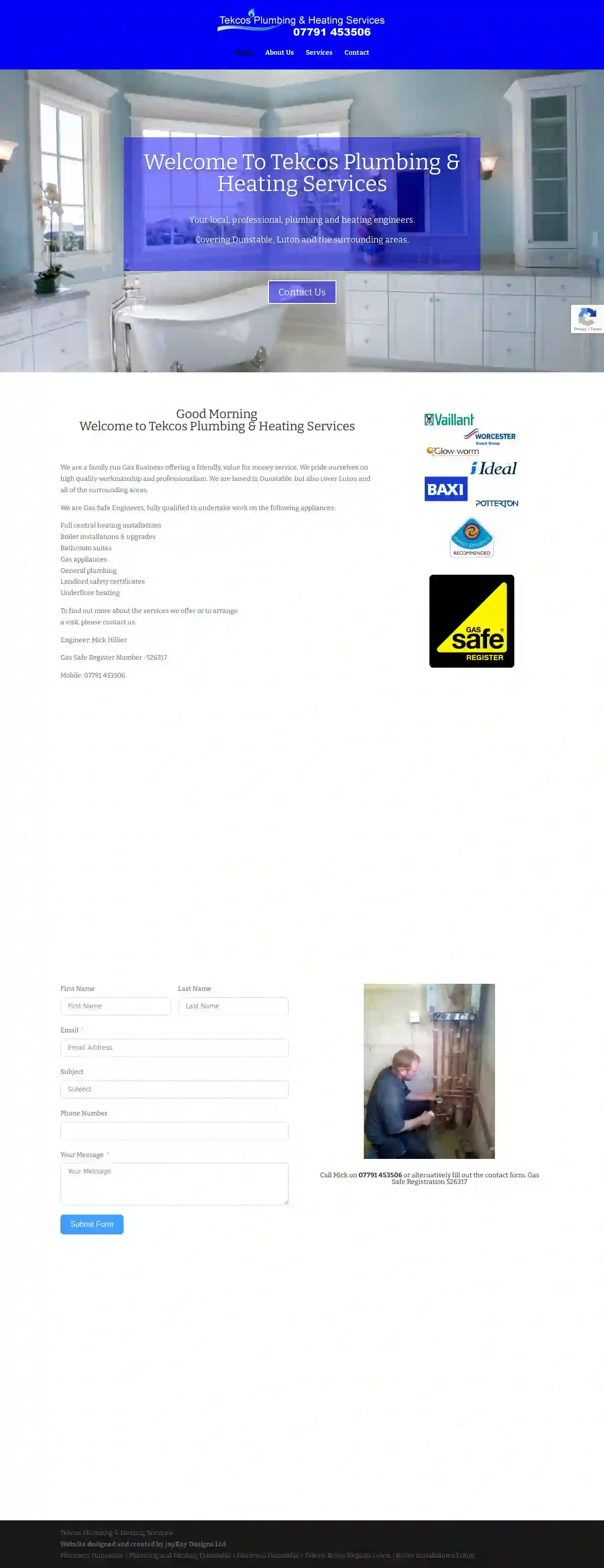
Tekcos (Plumbing & Heating & Electrical) Ltd
51 reviewsDunstable, GBWelcome to Tekcos Plumbing & Heating Services, your local, professional, plumbing and heating engineers. We specialise in boilers and all aspects of domestic plumbing and heating work. Our family run Gas Business offers a friendly, value for money service, with high quality workmanship and professionalism. We are based in Dunstable, but also cover Luton and all of the surrounding areas. We are Gas Safe Engineers, fully qualified to undertake work on the following appliances: full central heating installations, boiler installations & upgrades, bathroom suites, gas appliances, general plumbing, landlord safety certificates, underfloor heating. To find out more about the services we offer or to arrange a visit, please contact us.
- Services
- Why Us?
- Accreditations
- Our Team
- Gallery
Get Quote
Impulse Heating
56 reviewsThe Business Centre, 1000 Chester Road, Unit 10, Birmingham, B37 6AA, GBImpulse Heating Ltd is a family-run business with over 20 years of experience in the heating industry. We are based in the heart of the UK and provide a wide range of heating services to both domestic and commercial clients. Our team of highly skilled engineers is dedicated to providing our customers with the highest quality service at competitive prices. We are committed to providing our customers with a reliable and efficient service, and we are always happy to go the extra mile to ensure that they are satisfied. We offer a 24/7 emergency call-out service, so you can be sure that we are always there when you need us. At Impulse Heating Ltd, we believe that everyone deserves to be warm and comfortable in their home or business. That's why we offer a wide range of heating services, including boiler installations, repairs, and servicing. We also offer a range of other services, such as gas safety checks and power flushing. We are a Gas Safe registered company, so you can be sure that you are in safe hands. We are proud to be a family-run business, and we are committed to providing our customers with the highest level of service. We are always happy to answer any questions you may have, and we are always willing to go the extra mile to ensure that you are satisfied.
- Services
- Why Us?
Get Quote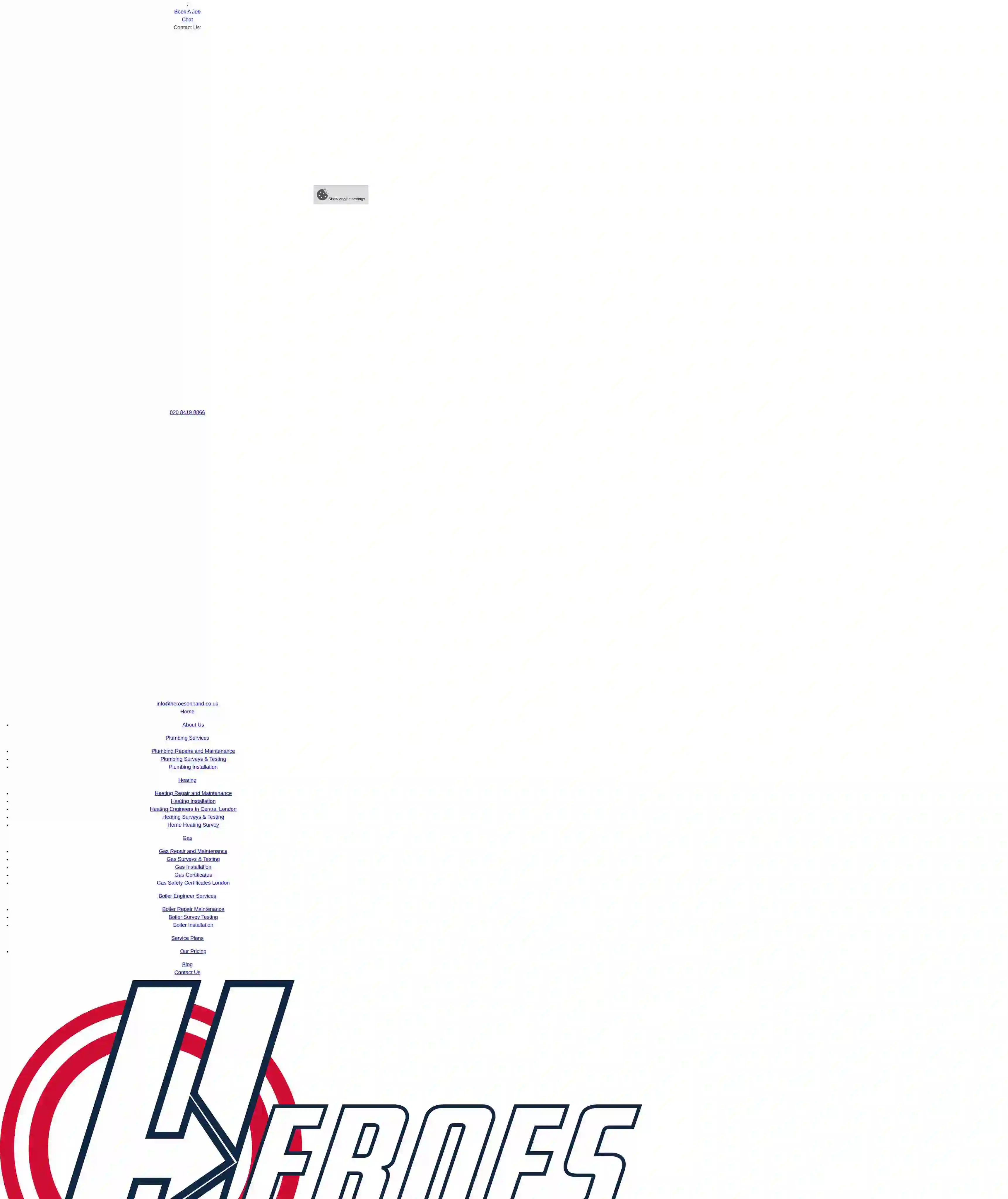
Heroes On Hand
4.935 reviews1st Floor Gallery Court, 28 Arcadia Avenue, 1st Floor Gallery Court 28 Arcadia Avenue, London, N3 2FG, GBWelcome to Heroes on Hand, your trusted partner for all your plumbing, gas, and heating needs in London. We understand the importance of a reliable and efficient heating system for your home and family. That's why we're dedicated to providing top-notch services, ranging from repairs and maintenance to installations of new systems. With over 15 years of experience in the industry, our Gas Safe registered engineers are highly qualified and equipped to handle any challenge. We pride ourselves on using only the highest quality parts and materials, ensuring long-lasting and reliable solutions. At Heroes on Hand, we believe in transparency and honesty. We provide upfront quotes with no hidden fees, so you can be confident in the cost of our services. Our friendly and helpful team is always ready to answer your questions and provide expert advice. We're committed to exceeding your expectations and ensuring your complete satisfaction. Whether you're a homeowner, landlord, or estate agent, we're here to help. Contact us today for reliable and affordable plumbing, gas, and heating solutions you can trust.
- Services
- Why Us?
- Accreditations
- Testimonials
- Gallery
Get Quote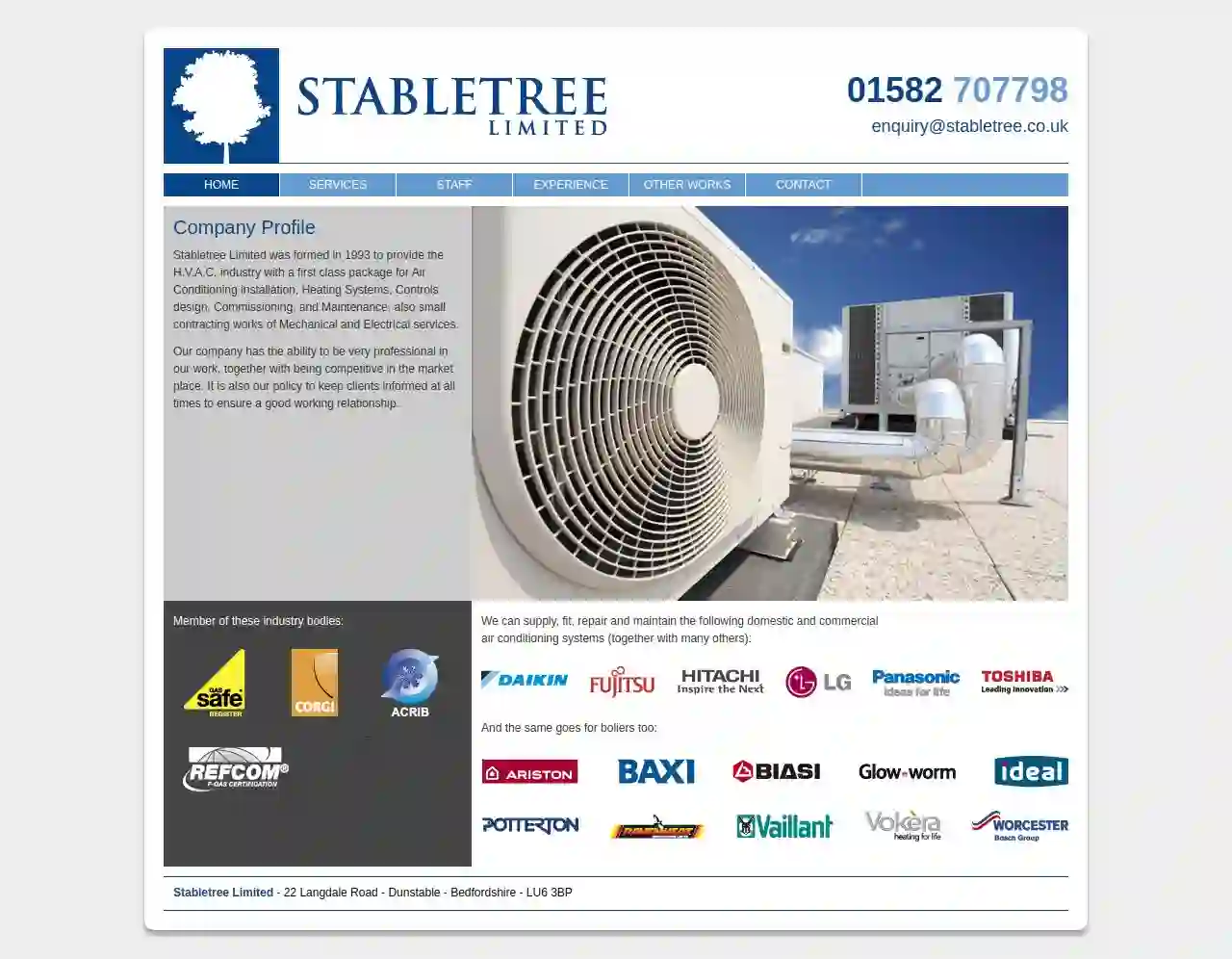
Stabletree Limited
22 Langdale Road, Dunstable, LU6 3BP, GBStabletree Limited was formed in 1993 to provide the H.V.A.C. industry with a first class package for Air Conditioning installation, Heating Systems, Controls design, Commissioning, and Maintenance, also small contracting works of Mechanical and Electrical services. Our company has the ability to be very professional in our work, together with being competitive in the market place. It is also our policy to keep clients informed at all times to ensure a good working relationship.
- Services
- Why Us?
- Accreditations
- Our Team
- Gallery
Get Quote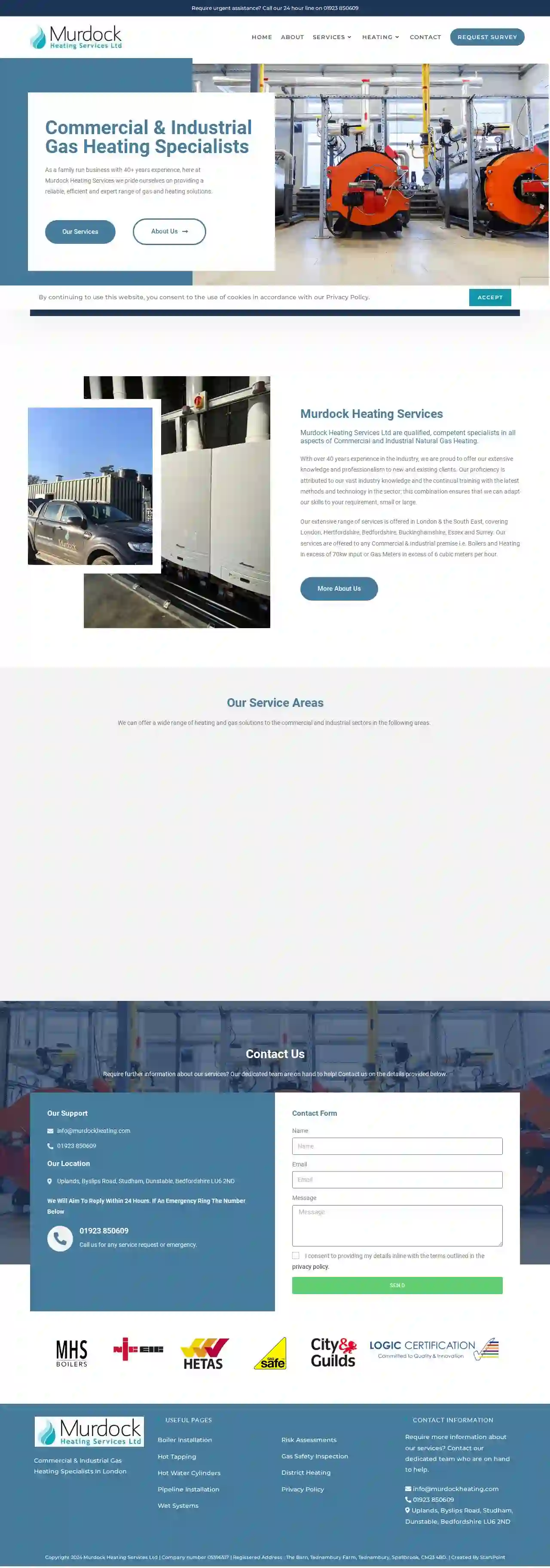
Murdock Heating Services
53 reviewsUplands, Byslips Road, Studham, Dunstable, LU6 2ND, GBMurdock Heating Services Ltd are qualified, competent specialists in all aspects of Commercial and Industrial Natural Gas Heating. With over 40 years experience in the Industry, we are proud to offer our extensive knowledge and professionalism to new and existing clients. Our proficiency is attributed to our vast industry knowledge and the continual training with the latest methods and technology in the sector; this combination ensures that we can adapt our skills to your requirement, small or large. Our extensive range of services is offered in London & the South East, covering London, Hertfordshire, Bedfordshire, Buckinghamshire, Essex and Surrey. Our services are offered to any Commercial & Industrial premise i.e. Boilers and Heating in excess of 70kw input or Gas Meters in excess of 6 cubic meters per hour. We take extreme pride in our approach; we listen to your requirements and expectations, and advise through our experience, the best viable and deliverable solution to include cost and energy efficiency. We offer an efficient, professional, and reliable service and all works are of the highest standard; as dictated by Industry Regulations. Our due diligence ensures all works meet with Health & Safety Standards and the current Legislation. Murdock Heating Services Ltd are proud to be registered with, and or members of Gas Safe Register, WRAS and IGEM. All Engineers are registered under the Murdock Heating Services Ltd Gas Safe Licence. Our qualifications have been gained with Logic and Adrian Brown Training. Our client basis is varied and works undertaken range from Fault Diagnosis to Complete Installation; building types include: Hotels, Care Homes, Stately Homes, Commercial & Industrial Manufacturing Units, Shopping Centres, Offices, large or small, Leisure Centres, and Workshops.
- Services
- Why Us?
- Accreditations
- Gallery
Get Quote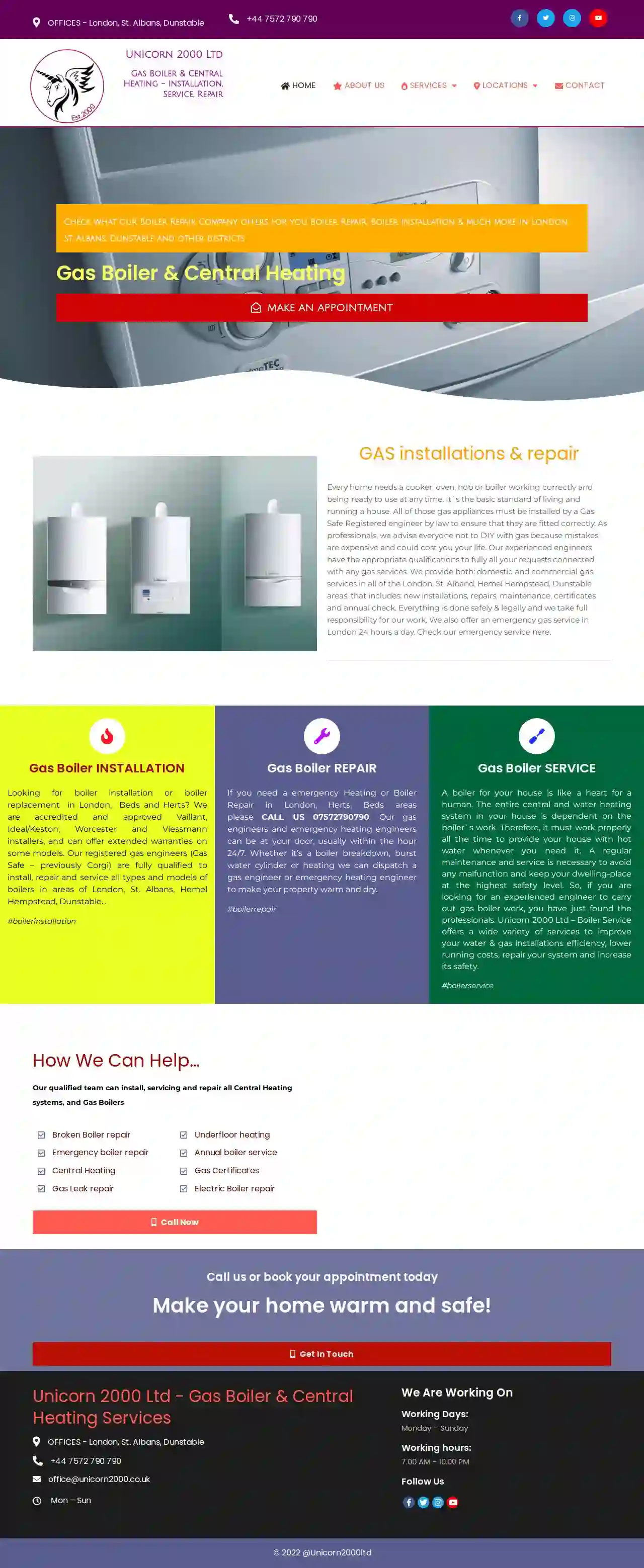
Unicorn 2000 - Gas Boiler Installation & Central Heating Services
510 reviewsDunstable, GBUnicorn 2000 Ltd is a Gas Safe registered company providing gas boiler and central heating services in London, St. Albans, Hemel Hempstead, and Dunstable. We offer a comprehensive range of services, including boiler installation, repair, and servicing, as well as central heating services for both domestic and commercial clients. Our experienced engineers are fully qualified to work on all types and models of boilers and are committed to providing safe and reliable service. We understand the importance of a working boiler for your home and offer a 24/7 emergency service to ensure you are never left without heat.
- Services
- Why Us?
- Accreditations
- Gallery
Get Quote
Air Conditioning & Smart Energy Solutions Ltd
512 reviewsSparrow Hall Farm, Unit 8B Barleyfields, Edlesborough, LU6 2ES, GBAir Conditioning & Smart Energy Solutions Ltd is an independent company with over 10 years of experience in the Air Conditioning Industry. We are approved installers for leading brands like Fujitsu, Mitsubishi Electric, Daikin, and Toshiba. Our team of F-Gas certified engineers are highly experienced in both commercial and residential installations. We pride ourselves on providing high-quality installations that are independently certified and accredited by Refcom. We also specialize in EV Charger Installations, undertaken by fully qualified electricians specifically trained for this purpose. We offer free surveys and fixed-cost quotations, ensuring transparency and peace of mind for our clients.
- Services
- Why Us?
- Accreditations
- Our Team
- Gallery
Get Quote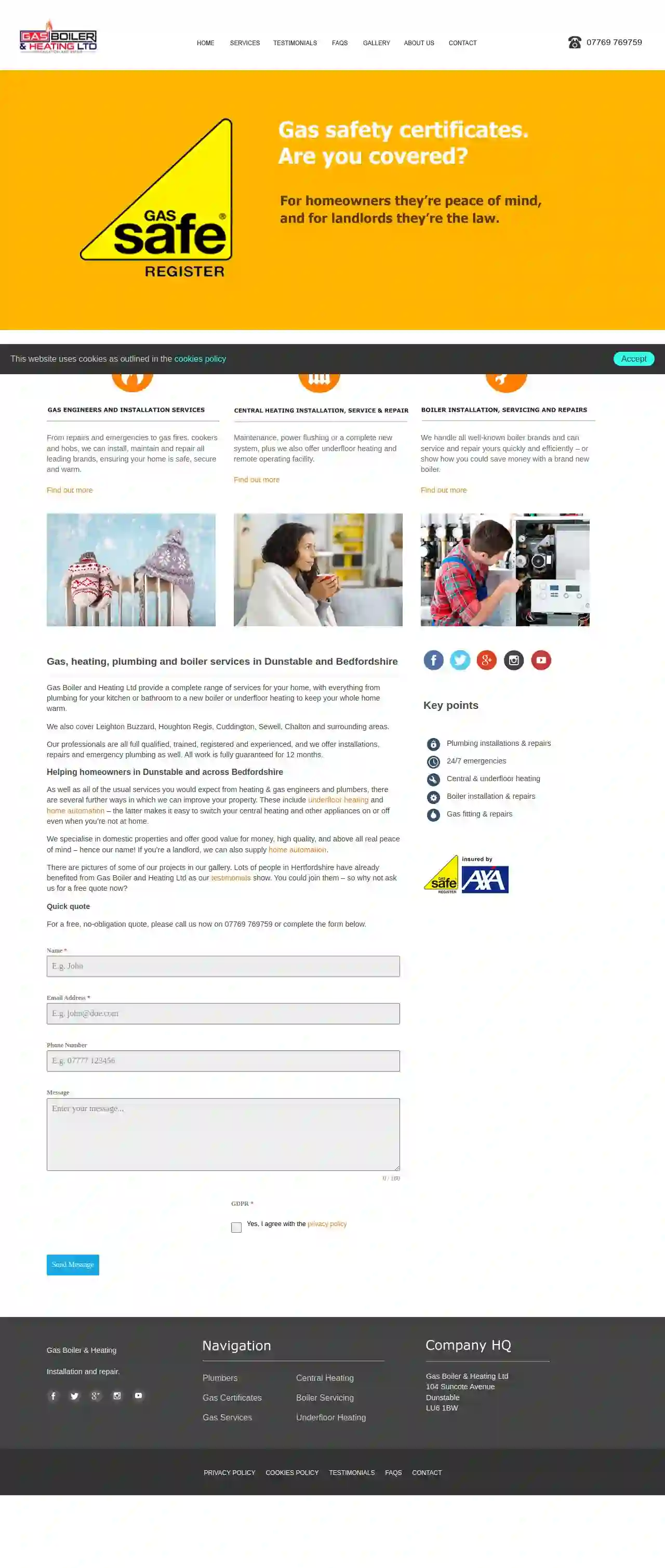
Gas Boiler & Heating Ltd - Installation & Repair
5113 reviews104 Suncote Avenue, Dunstable, LU6 1BW, GBGas Boiler and Heating Ltd provides a complete range of services for your home, with everything from plumbing for your kitchen or bathroom to a new boiler or underfloor heating to keep your whole home warm. We also cover Leighton Buzzard, Houghton Regis, Cuddington, Sewell, Chalton and surrounding areas. Our professionals are all full qualified, trained, registered and experienced, and we offer installations, repairs and emergency plumbing as well. All work is fully guaranteed for 12 months. Whether you’re based in Dunstable, Luton, Leighton Buzzard, Houghton Regis, Cuddington, Sewell, Chalton or anywhere else in Bedfordshire, we can help.
- Services
- Why Us?
- Testimonials
- Gallery
Get Quote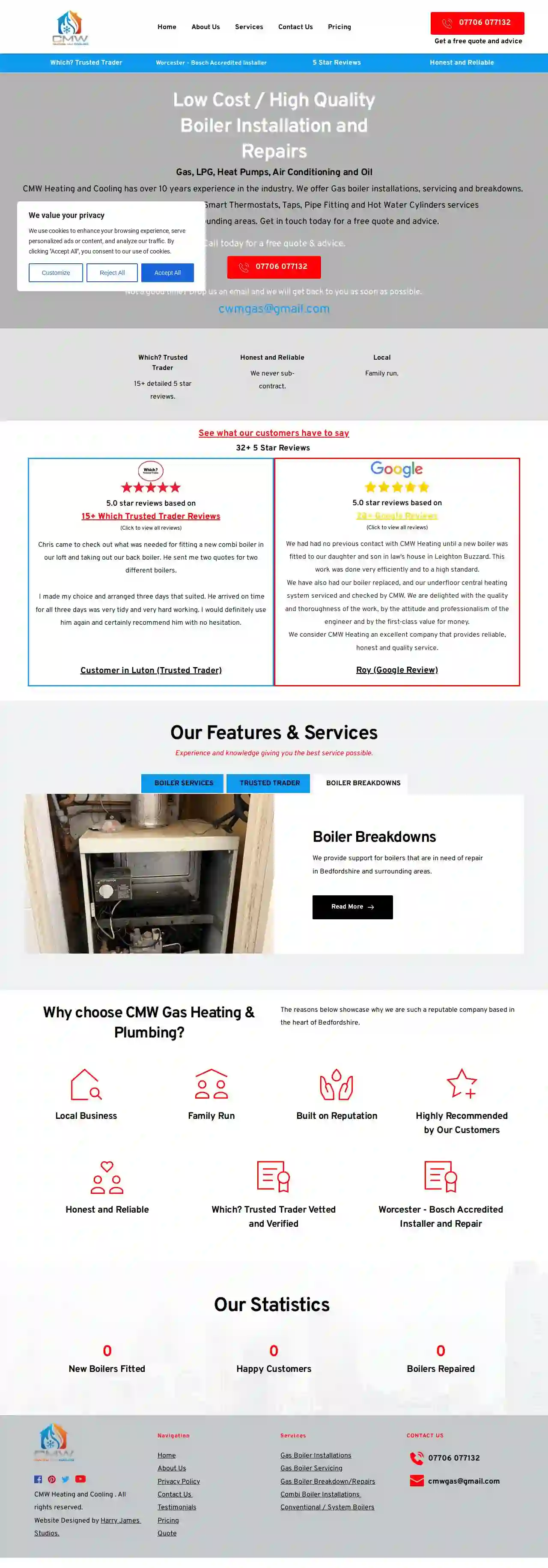
CMW Heating & Cooling
552 reviewsDunstable, GBCMW Heating and Cooling is a family-run business with over 10 years of experience in the industry. We offer a range of services including gas boiler installations, servicing, and breakdowns, as well as power-flushing and magnacleanse, smart thermostats, taps, pipe fitting, and hot water cylinders. We pride ourselves on being a reputable and honest company, with a strong reputation in the industry. We have 32+ 5-star reviews on Google and Which? Trusted Trader, and we never subcontract our work. We offer a price match guarantee on new boilers and a free boiler service for the first year. Our team is highly experienced and knowledgeable, and we are committed to delivering high-quality workmanship and exceptional customer service to every client we serve in Bedfordshire and surrounding areas.
- Services
- Why Us?
- Accreditations
- Our Team
- Testimonials
- Gallery
Get Quote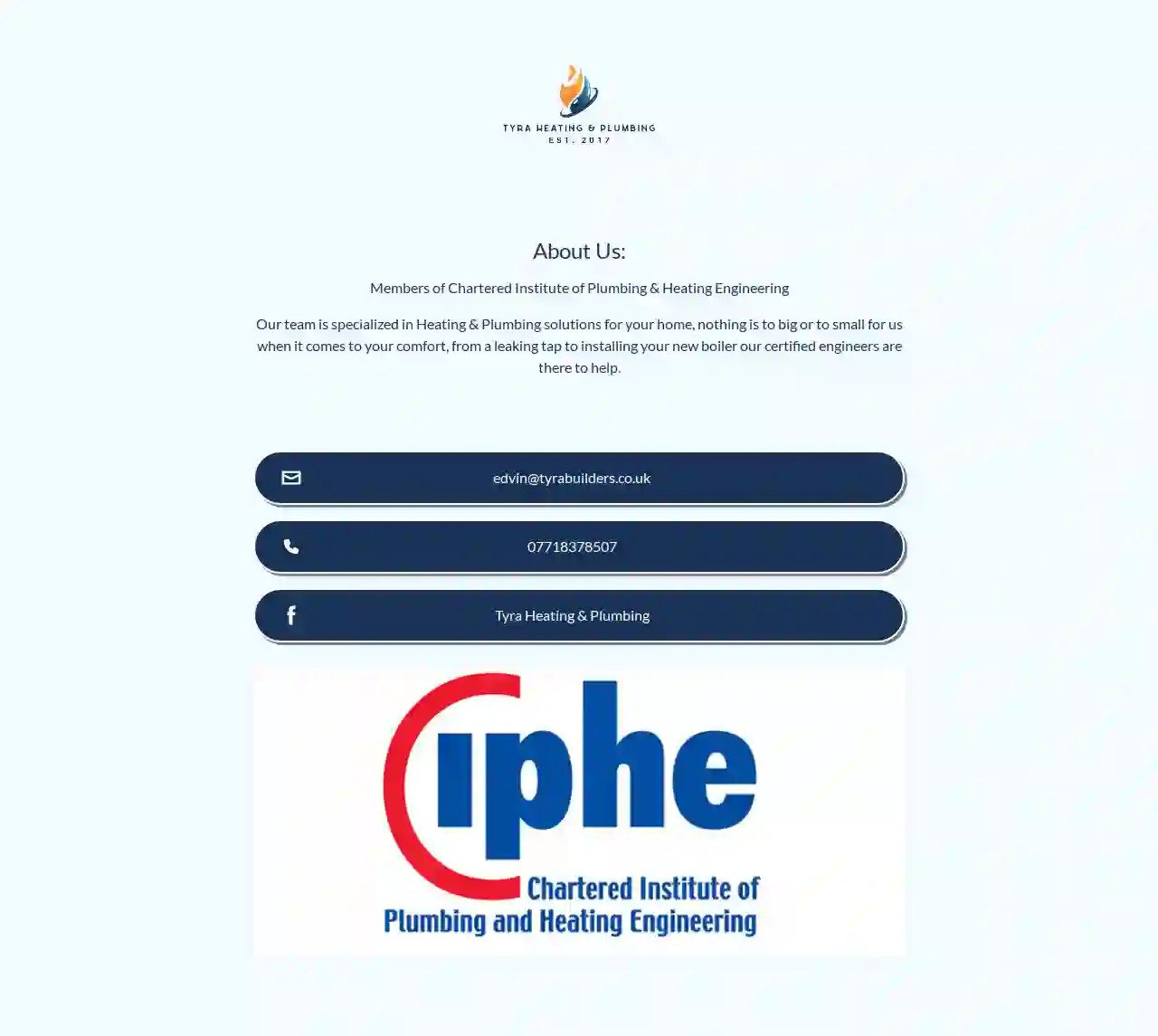
Tyra Heating & Plumbing
Dunstable, GBTyra Heating & Plumbing is a team of certified engineers specializing in heating and plumbing solutions for your home. No job is too big or too small for us, from a leaking tap to installing your new boiler, we are here to help ensure your comfort.
- Services
- Why Us?
- Our Team
- Gallery
Get Quote
Over 12,692+ HVAC Businesses registered
Our HVAC pros operate in Toddington and surroundings!
HVACCompaniesHub has curated and vetted the Best HVAC Businesses in Toddington. Find a top & trustworthy business today.
Frequently Asked Questions About Emergency HVAC Services
- Change or clean air filters every 1-3 months.
- Clear debris from around the outdoor unit.
- Check and clean the evaporator coil (if accessible).
- Inspect refrigerant lines for leaks.
- Turn off the system: Switch off your HVAC system at the thermostat.
- Turn off the power: Locate the circuit breaker for your HVAC system and turn it off.
- Wait: Wait at least 5 minutes for the system to completely power down.
- Restore power: Turn the circuit breaker back on.
- Turn on the system: Switch your HVAC system on at the thermostat.
- Insulate Pipes: Insulate exposed pipes in unheated areas, such as crawl spaces, attics, and garages.
- Seal Air Leaks: Seal air leaks and cracks in walls and foundations near pipes.
- Keep Thermostat Consistent: Maintain a consistent thermostat setting, even when you are away, to keep indoor temperatures above freezing.
- Open Cabinet Doors: Open cabinet doors under sinks to allow warmer air to circulate around pipes.
- Let Faucets Drip: During freezing temperatures, allow cold water taps to drip slowly to keep water moving and prevent freezing.
What is a smart thermostat, and how can it save me money?
How do I maintain my air conditioner?
How do I reset my HVAC system?
How can I prevent frozen pipes in the winter?
What is a smart thermostat, and how can it save me money?
How do I maintain my air conditioner?
- Change or clean air filters every 1-3 months.
- Clear debris from around the outdoor unit.
- Check and clean the evaporator coil (if accessible).
- Inspect refrigerant lines for leaks.
How do I reset my HVAC system?
- Turn off the system: Switch off your HVAC system at the thermostat.
- Turn off the power: Locate the circuit breaker for your HVAC system and turn it off.
- Wait: Wait a few minutes for the system to completely power down.
- Restore power: Turn the circuit breaker back on.
- Turn on the system: Switch your HVAC system on at the thermostat.
How can I prevent frozen pipes in the winter?
- Insulate Pipes: Insulate exposed pipes in unheated areas, such as crawl spaces, attics, and garages.
- Seal Air Leaks: Seal air leaks and cracks in walls and foundations near pipes.
- Keep Thermostat Consistent: Maintain a consistent thermostat setting, even when you are away, to keep indoor temperatures above freezing.
- Open Cabinet Doors: Open cabinet doors under sinks to allow warmer air to circulate around pipes.
- Let Faucets Drip: During extremely cold weather, allow faucets to drip slowly to relieve pressure and prevent pipes from bursting.